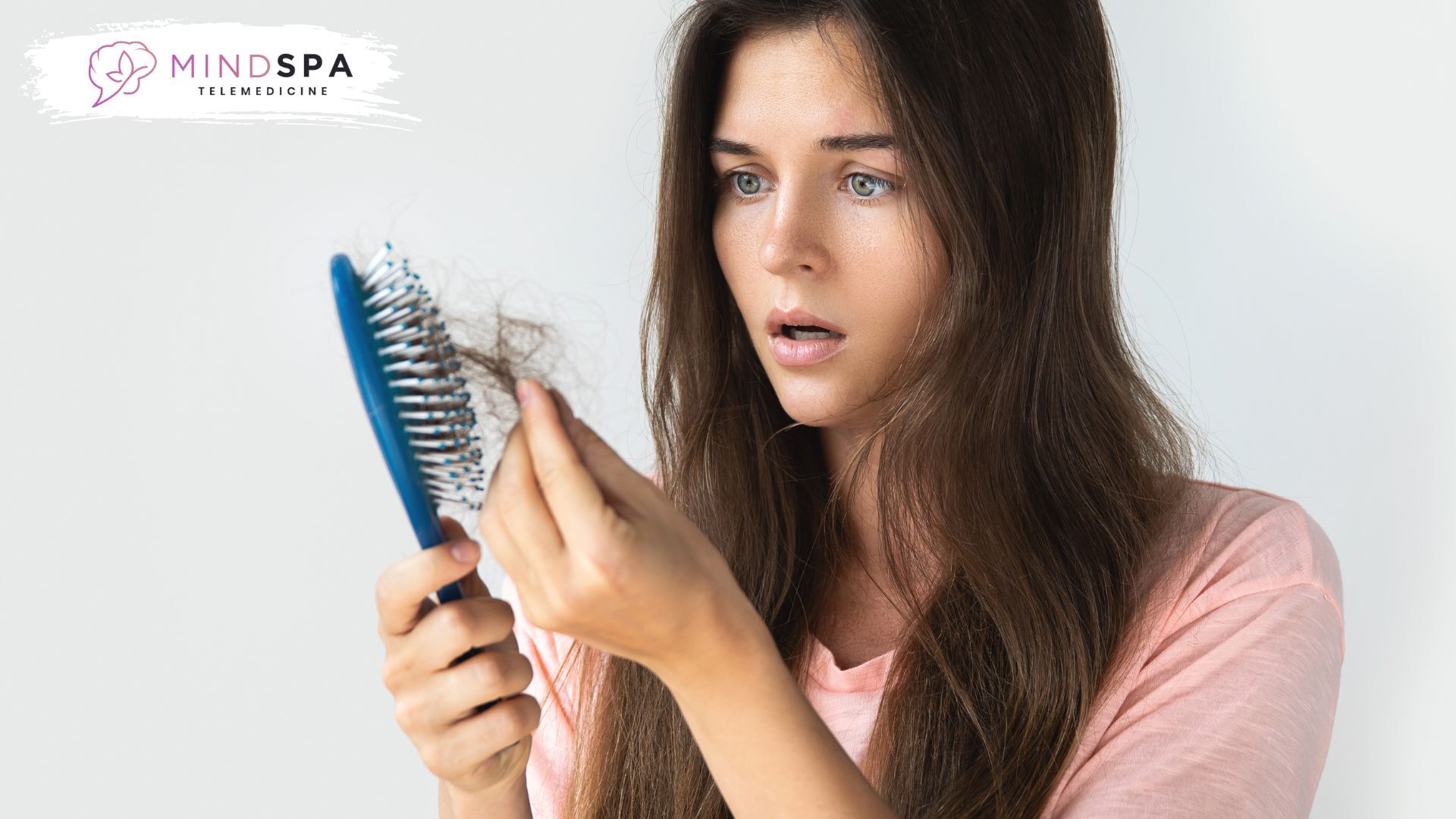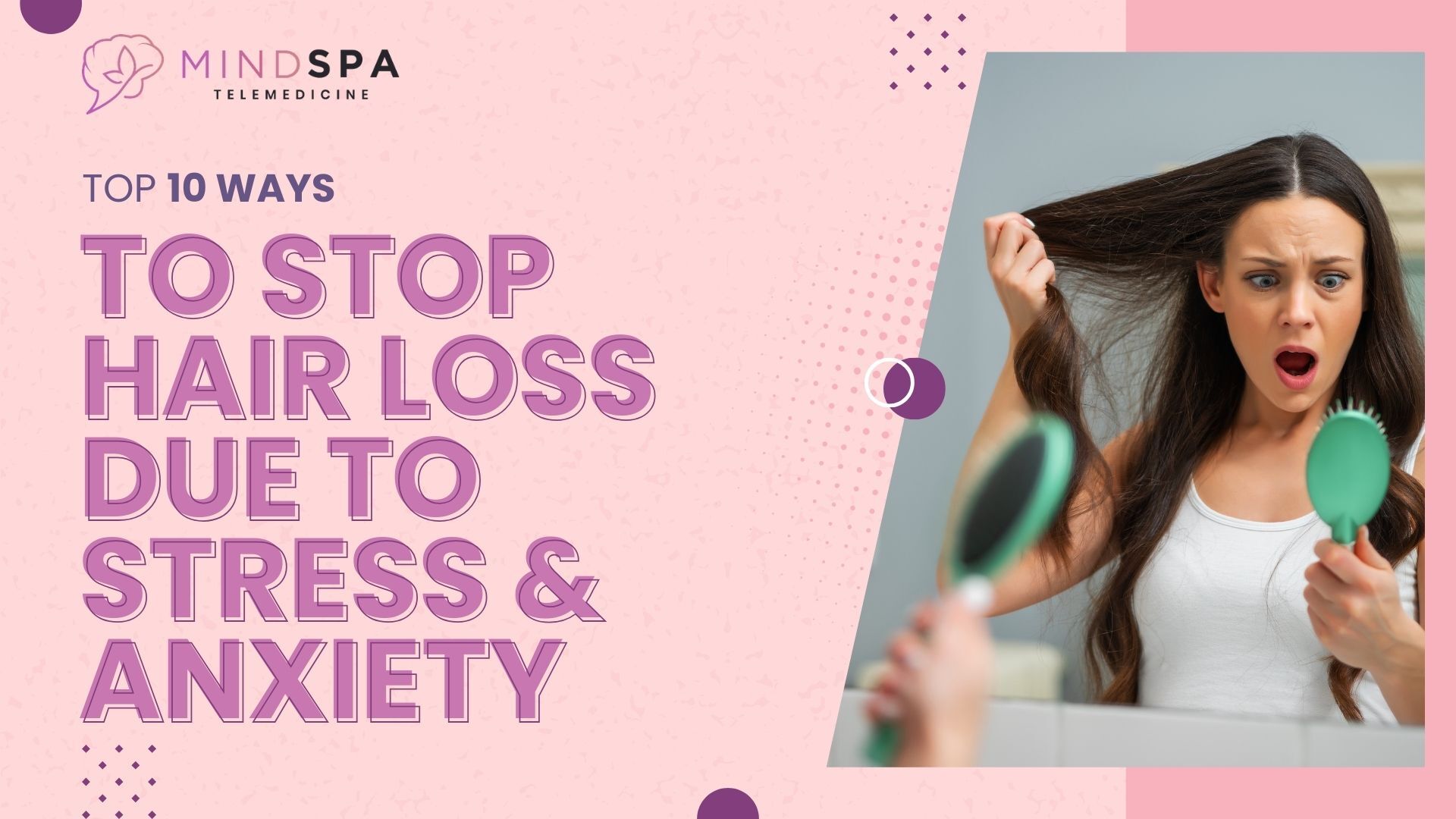Stress and hair loss do go hand in hand. It’s common for most healthy individuals to shed between fifty to one hundred hair strands from their heads each day. We continually lose our old hair and grow new ones.
Nevertheless, one question that people often would like to know is can hair fall due to stress. Well, the answer is yes. This article will describe ten methods of how to stop hair loss due to stress or ensuring the head’s healthy state.
Types of Stress-Related Hair Loss
- Telogen Effluvium – It results from situations where there is a high degree of stress, the hair follicles go into a dormant phase. Such hairs can easily fall out when you are combing or washing your hair a few months after the treatment.
- Trichotillomania – This impulse control disorder involves pulling out hair on the scalp, eyebrows or other body areas. Hair pulling can help cope with negative or uncomfortable emotions such as stress, anxiety, loneliness, boredom, and irritation.
- Alopecia Areata – It may be caused by many reasons, including acute stress. In this condition, the immune system destroys the hair follicles, resulting in hair loss.
10 Ways to Stop Hair Loss Related to Stress
The good news about stress-related hair loss is that it is usually reversible. Stress and hair loss do not need to be permanent. If you get your stress under control, your hair may regrow.
Trichotillomania-related cases typically require psychosocial assistance. However, the great majority of instances of telogen effluvium resolve spontaneously approximately six months after beginning.
If you’re experiencing stress-related hair loss, consider the following 10 ways to boost regrowth and disguise weak spots:
1. Understand the Symptoms
First, one has to know some symptoms of hair loss due to stress. Common signs and symptoms of stress-related hair loss include sudden hair loss, thinning patches mostly on the scalp region, and more hair removed while brushing or taking a shower or found on pillows.
Knowing such signs is important to prevent additional loss and do it without delay.
2. Don’t Use Chemicals and Heat on Your Hair
You should avoid using chemical dyes and heat-based treatments on your hair. They can damage your hair and cause breakage and excessive hair fall. Try not to wash your hair with hot water. It can dry the scalp and induce temporary irritation, making hair strands thinner and more prone to breakage.
3. Have a Healthy Diet
Minimize stress levels and ensure that you take foods that are rich in vitamins and minerals to enhance the right hair growth. Biotin and protein containing food like egg and milk are helpful in promoting the growth of hair and nails. Bananas also contain biotin.
You may also use vitamin nutritional supplements that contain antioxidants such as the vitamins C & E and omega-3 fatty acids. Studies show that antioxidants improve scalp condition and can reduce hair shedding and, thus, increase perceived hair fullness. To avoid any adverse effects that might be caused by the interaction between the supplement and any other drug you are on, consult the doctor first.
4. Regular Exercise
Prioritizing exercise can be a very effective remedy for stress and a great way to ensure good hair condition. Studies say that when you exercise, your body releases feel-good chemicals called endorphins, which help reduce stress.
Also, physical exercise enhances circulation throughout the body, including your head and scalp, to help your hair grow. Whether it is just brisk walking, a practice of Yoga, or playing tennis, being active really brings about major changes.
5. Use Gentle Hair Care Products
Many shampoos include chemicals that can harm hair, causing breaking and excessive shedding. To decrease these difficulties, avoid using sulfates, polyethylene glycol, and parabens. Instead, choose shampoos that include chemicals that help plump each strand, making the hair look fuller. While not all products claiming to thicken hair are effective, some do.
Do some study or ask your hairdresser for help. Shampoos with keratin, which is a protein present in hair, can help in getting healthier hair. Furthermore, treatments with biotin, panthenol (vitamin B5), and amino acids may make your hair seem thicker and shinier.
6. Massage Your Scalp
Scalp massages improve blood flow to the hair follicles, thus hair growth is enhanced. Gently massage your scalp with your fingers and in circular motion once a day for approximately 5 minutes.
You can add a few drops of lavender, rosemary, or peppermint oil to increase the effect of massage. Some of these oils are deemed to have the miraculous effect on helping to grow hair as well as relieving stress.
7. Seek Professional Help
If stress and anxiety become uncontrollable, it is advisable to consult a therapist or a psychologist. For hair to be healthy, the cause of stress needs to be dealt with comprehensively.
8. Get Enough Sleep
Anxiety and tension may significantly interrupt sleep, resulting in insomnia and other sleep problems that may further alter the body’s chemical balance.
Strive for a consistent 7 to 9 hours of sleep every night and practice excellent sleep hygiene habits such as going to bed and waking up at the same time every day, sleeping in a cool, dark room, and blocking noise and keeping devices out of the bedroom.
9. Hydrate Well
Less water intake results in hair loss. Staying hydrated is important for the health of your body and scalp. Drinking enough water improves the general functioning of your body.
10. Consider Supplements
Supplements are also recommended if nutrients need to be added to the diet plan. Vitamins biotin, iron, zinc, and D enhance hair health. Talk to a healthcare provider before beginning any new supplement to deal with stress and anxiety.

Conclusion
You have now got the answer for how do I stop my hair falling out due to stress. Managing hair fall due to stress can be complicated. You should learn about the symptoms of stress and how to cope with stress.
Pay extra attention to what you eat. It also affects your hair health. Visiting a professional, getting enough sleep, proper hydration, and possible supplementation will mitigate stress and hair loss.
Related Questions
How to stop hair fall due to stress in females and male?
Exercising, taking up, and engaging in yoga or meditation, can help relieve stress. You can also seek help from a psychologist or your doctor.
Can hair grow back after stress loss?
Yes, it can. But, it depends on the person and its overall condition.
How can I know if stress is the real reason for hair loss?
Autoimmune diseases, drugs, hormonal imbalances, and hereditary factors can also cause hair loss. Treatment for hair loss should be determined after consulting your doctor.


